Key Takeaways:
- The journey after bariatric surgery involves gradual dietary changes and consistent physical activity.
- Regular health monitoring and supplements are essential for avoiding complications.
- Emotional support and lifestyle adjustments play an important role in your long-term success.
Bariatric surgery marks the beginning of a life-changing journey. Knowing what to expect can help you prepare for the challenges and celebrate the victories along the way.
You’ll need to make significant changes to how you eat, move, and even how you think about yourself.
This guide will walk you through what to expect in the weeks, months, and years following your procedure.
Table of Contents
Immediate Post-Surgery Phase (0-6 Weeks)
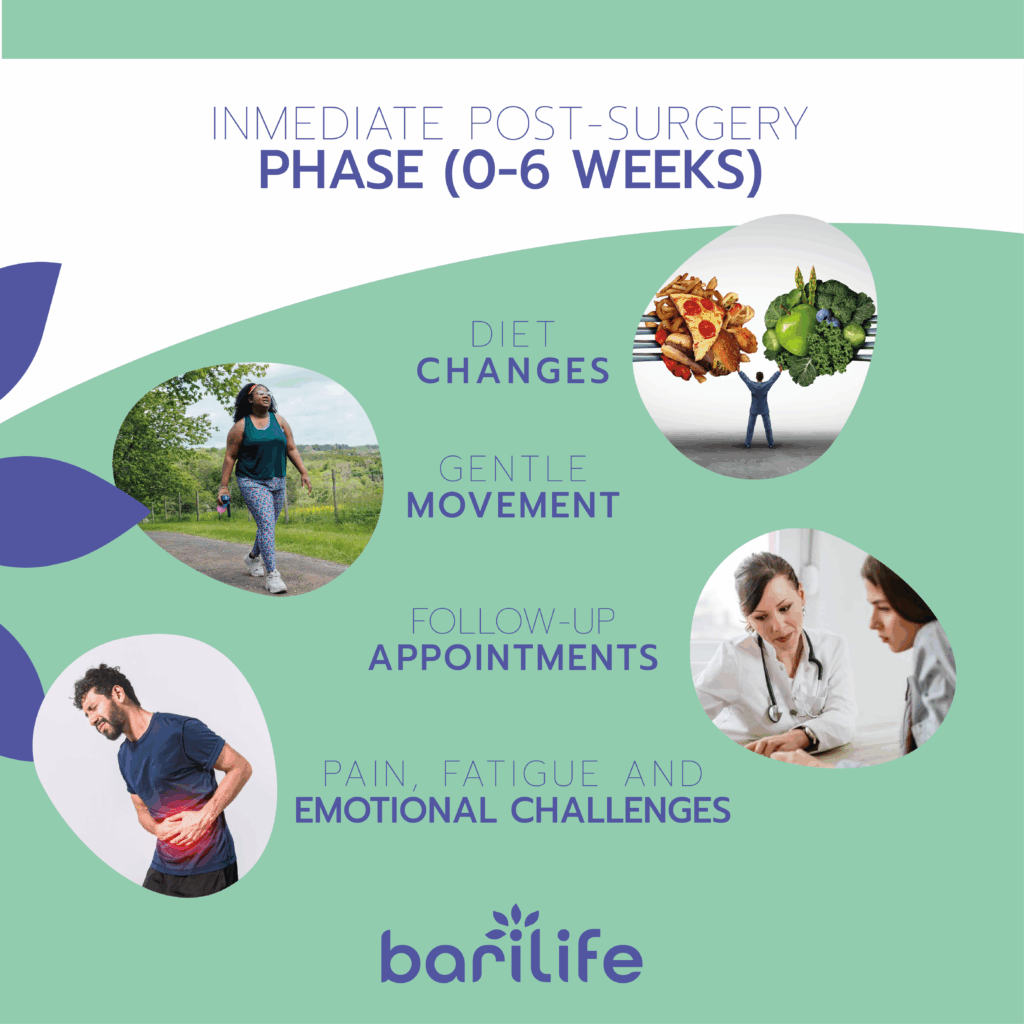
Here are several things you can expect in the weeks immediately following surgery.
Diet Changes
The first six weeks after surgery are all about healing and adjustment. During this time, your body is recovering from a major procedure while adapting to its new digestive system.
Your diet will progress through several stages. Most people start with clear liquids for the first few days, then advance to full liquids like protein shakes and smooth soups. Around week three, you’ll move to pureed foods and finally to soft foods by weeks 4-6. This gradual progression allows your stomach time to heal.
Gentle Movement
Even though you might feel tired, getting up and moving is important. Light walking helps prevent blood clots, improves circulation, and can speed up recovery. Start with short walks around your home and slowly increase the duration and intensity as your energy improves.
Follow-Up Appointments
During these weeks, you’ll have several follow-up appointments with your healthcare team. These visits are important because they’ll check your incisions, monitor your nutrition, and address any concerns you might have. Don’t skip these appointments, even if you’re feeling great!
Pain, Fatigue, and Emotional Challenges
At this stage, you might experience some discomfort, fatigue, or emotional ups and downs. This is completely normal. Your body is healing from surgery while adjusting to significant changes in eating and digesting food. Be patient with yourself, and remember that this initial challenging period is temporary.
Nutritional Changes & Long-Term Eating Habits
Life after bariatric surgery means building a new relationship with food. Your smaller stomach can only hold about 1/4 cup of food initially, so you must make every bite count nutritionally.
Importance of Protein
Protein becomes a top priority. Most healthcare providers advise consuming 60-80 grams of protein daily to preserve muscle mass and support healing. Some great sources of protein include eggs, lean meats, dairy, and protein supplements. Understanding how to build muscle after bariatric surgery is essential—prioritize protein, and include strength training when approved.
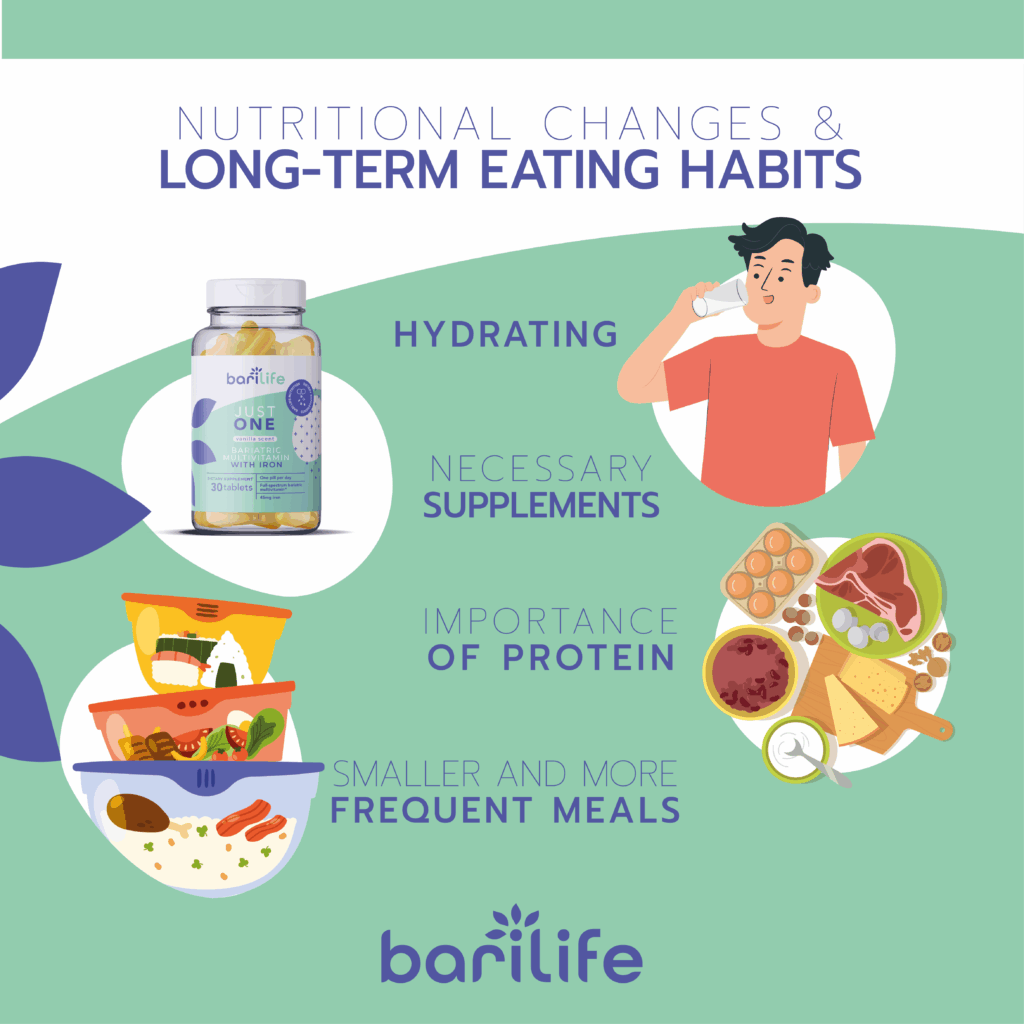
Smaller and More Frequent Meals
Your new eating pattern will likely involve 4-6 small meals throughout the day instead of three large ones. Take small bites, chew slowly, and eat mindfully to avoid discomfort. This also allows you to recognize when you’re already full.
Hydrating
Staying hydrated is also important, but you should drink between meals instead of with food. Try to aim for 64 ounces of water daily, sipping continuously throughout the day when you’re not eating.
Foods Changes
Certain foods may cause problems after surgery. Many people find that the following foods are difficult to tolerate:
- High-sugar foods
- High-fat foods
- Carbonated beverages
- Alcohol
- Tough meats
Necessary Supplements
After bariatric surgery, vitamin and mineral supplements become a non-negotiable part of daily life. Depending on your specific procedure, you’ll likely need to take a multivitamin, calcium, vitamin D, vitamin B12, and possibly iron supplements for life. These prevent serious nutritional deficiencies that can develop after bariatric surgery.
Physical and Lifestyle Adjustments
Here are some changes you’ll need to make regarding your physical activities and lifestyle.
Regular Exercise
Exercise after bariatric surgery becomes an essential part of your lifestyle after bariatric surgery. Exercise helps preserve muscle mass during rapid weight loss, improves mood, boosts energy, and helps maintain your weight loss long-term.
Aside from walking, you can also gradually add strength training if your healthcare team approves. This can include toning exercises after bariatric surgery, such as resistance band work, bodyweight exercises, or light weights. By 6-12 months after surgery, aim for at least 2.5 hours of moderate exercise weekly, plus strength training 2-3 times weekly.
Meeting With a Therapist
Many people benefit from working with a behavioral therapist after surgery. These professionals can help you develop new coping strategies besides turning to food for comfort. They can also help you address emotional eating patterns and build healthier habits around food and exercise.
Alcohol and Smoking Nicotine
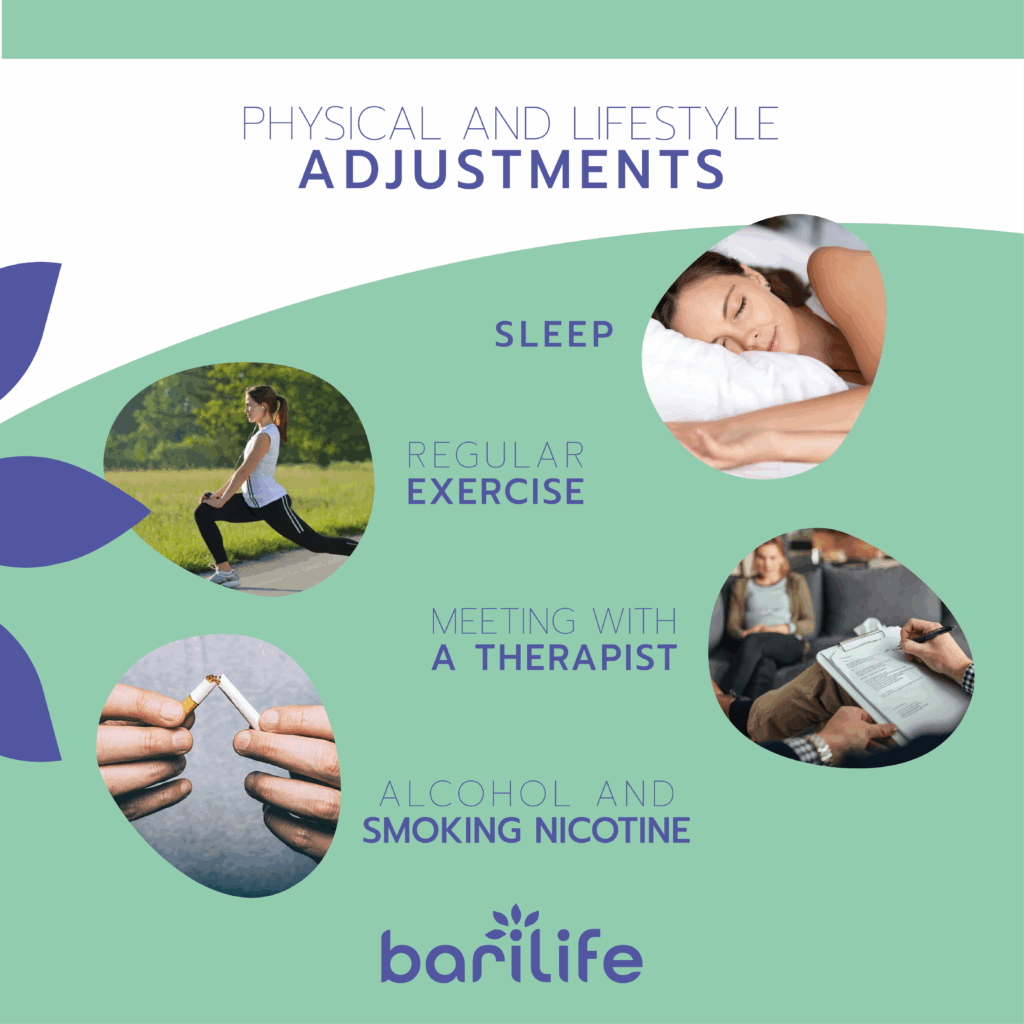
Alcohol will affect you differently after bariatric surgery. You’ll likely feel its effects much faster and more intensely. Many healthcare providers recommend avoiding alcohol completely, especially in the first year.
Smoking after bariatric surgery should also be avoided because it increases the risk of complications and can slow down your healing. If you smoked before your procedure, talk with your healthcare provider about cessation programs and alternatives.
Medications
Your medication routine may also change post-surgery. Some medications may be absorbed differently, and others (like certain pain relievers) might irritate your smaller stomach.
Always check with your healthcare provider before taking any medication, including over-the-counter drugs.
Sleep
How to sleep after bariatric surgery? It is a common concern for many patients. Sleep patterns will often improve as your weight decreases, especially if you had sleep apnea before surgery. Better sleep means you’ll enjoy better health, which makes it easier to keep healthy habits.
Health Monitoring & Potential Complications
Regular check-ups are also important long after surgery. Most healthcare teams recommend visits at 3, 6, and 12 months post-surgery and annually after that. These appointments include blood tests to check for vitamin deficiencies, blood sugar levels, cholesterol, and other health markers.
Watch out for warning signs that might indicate complications. These include:
- Persistent nausea
- Vomiting
- Severe abdominal pain
- Difficulty swallowing
- Unusual fatigue
These symptoms could signal problems that require medical attention. Don’t hesitate to call your healthcare provider if you experience any alarming symptoms.
Overall Health Changes
Many health conditions improve dramatically after bariatric surgery. Diabetes, high blood pressure, joint pain, and sleep apnea often get better or even resolve completely. However, these conditions still require monitoring, and you should continue taking prescribed medications unless your doctor says otherwise.
Social & Psychological Aspects
Life after bariatric surgery brings emotional and social changes that can be just as significant as the physical ones. As your body changes rapidly, your self-image needs time to catch up. Many people report feeling like they don’t recognize themselves in the mirror for a while.

Support groups can be incredibly valuable during this transition. Connecting with others who understand exactly what you’re going through provides validation, practical tips, and encouragement. Many hospitals and clinics offer in-person or online support groups specifically for bariatric patients.
You’ll also notice that relationships shift after significant weight loss. Some friends and family members may react supportively, while others might struggle to adjust to the “new you.” During this time, it’s important to have open communication about your needs and boundaries with those closest to you.
Speaking with a mental health specialist can help you navigate body image concerns, identity changes, and any emotional challenges that arise. Some people experience transfer addiction after bariatric surgery, where food is replaced with another potentially problematic behavior, like shopping or alcohol. A therapist can help identify these patterns and help you fix them before they negatively impact your life.
Additionally, topics like sex after bariatric surgery may come up, as physical and emotional changes affect intimacy. Some people experience increased confidence and energy, while others may feel vulnerable or uncertain. It’s important to maintain open communication with partners and consider counseling if issues arise.
Make sure to celebrate small victories that are not related to the number on the scale. Improvements such as climbing the stairs without getting winded, crossing your legs comfortably, or shopping in regular clothing stores might not seem like much, but oftentimes, they’re enough motivation for your journey.
Long-Term Success & Maintaining Weight Loss
Most people reach their maximum weight loss around 12-18 months after bariatric surgery. After this point, the focus shifts to maintaining that weight loss long-term.
Successful maintenance typically requires:
- Continuing to prioritize protein and nutrient-dense foods
- Regular medical follow-ups
- Regular physical activity that include cardio and strength training
- Consistent supplement intake
- Ongoing participation in support systems
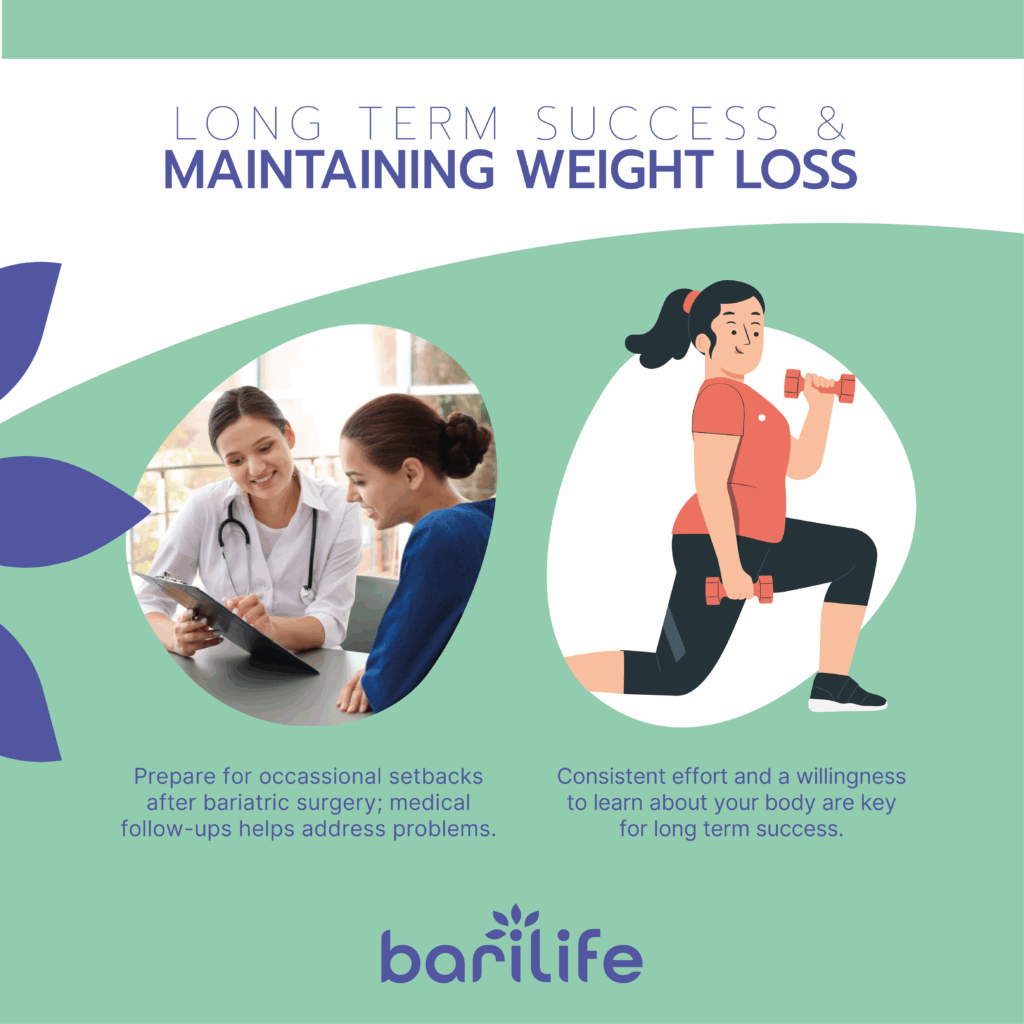
Life after bariatric surgery means being prepared for occasional setbacks. Periods of stress, health issues, or major life changes can challenge your new healthy routines. Having a plan for getting back on track quickly is key to preventing small slips from becoming major backslides.
Some people benefit from “refresher” sessions with dietitians or behavioral specialists, especially around the 2-year mark when initial habits might start to fade. These check-ins help reinforce strategies and address new challenges that may arise.
Keep in mind that bariatric surgery is a tool, not a cure. Long-term success requires consistent effort and a willingness to continue learning about your changing body and its needs.
Takeaway
Life after bariatric surgery requires significant changes to your eating habits, physical activity, healthcare needs, and even social relationships.
The journey brings both challenges and remarkable rewards as your health gets better and your quality of life increases.
By staying committed to your new habits, keeping regular medical appointments, using your support systems, and tackling both physical and emotional aspects of your health, you can get the most benefits of your surgery for years to come.
How Bari Life Can Help
Facing life after bariatric surgery is easier when you have the proper nutritional support. That’s where Bari Life comes in. We understand the unique challenges you have during this journey.
Our specially formulated bariatric vitamins and supplements are designed for post-surgery needs. Unlike regular store-bought supplements, Bari Life products address specific nutritional requirements and absorption challenges after weight loss surgery.
In addition to our vitamin solutions, we offer a wide range of bariatric protein shakes and bariatric protein bars to support your daily protein intake—essential for maintaining muscle mass and promoting recovery. For those needing a quick and satisfying bite, our assortment of bariatric snacks is both delicious and compliant with your post-surgery dietary guidelines.
We also understand the importance of bone and digestive health. That’s why Bari Life offers bariatric calcium chews for optimal calcium absorption, and a high-quality bariatric probiotic to support gut health and nutrient uptake.
To help with specific concerns like thinning hair, our targeted bariatric vitamins for hair loss ensure your body receives the nourishment it needs during rapid weight loss phases. We even offer a convenient liquid bariatric vitamin for those who have difficulty swallowing pills.
Visit Bari Life today to discover how our specialized products—from bariatric multivitamins to bariatric snacks—can support your new life after bariatric surgery and help you keep momentum in your weight loss journey for years to come!
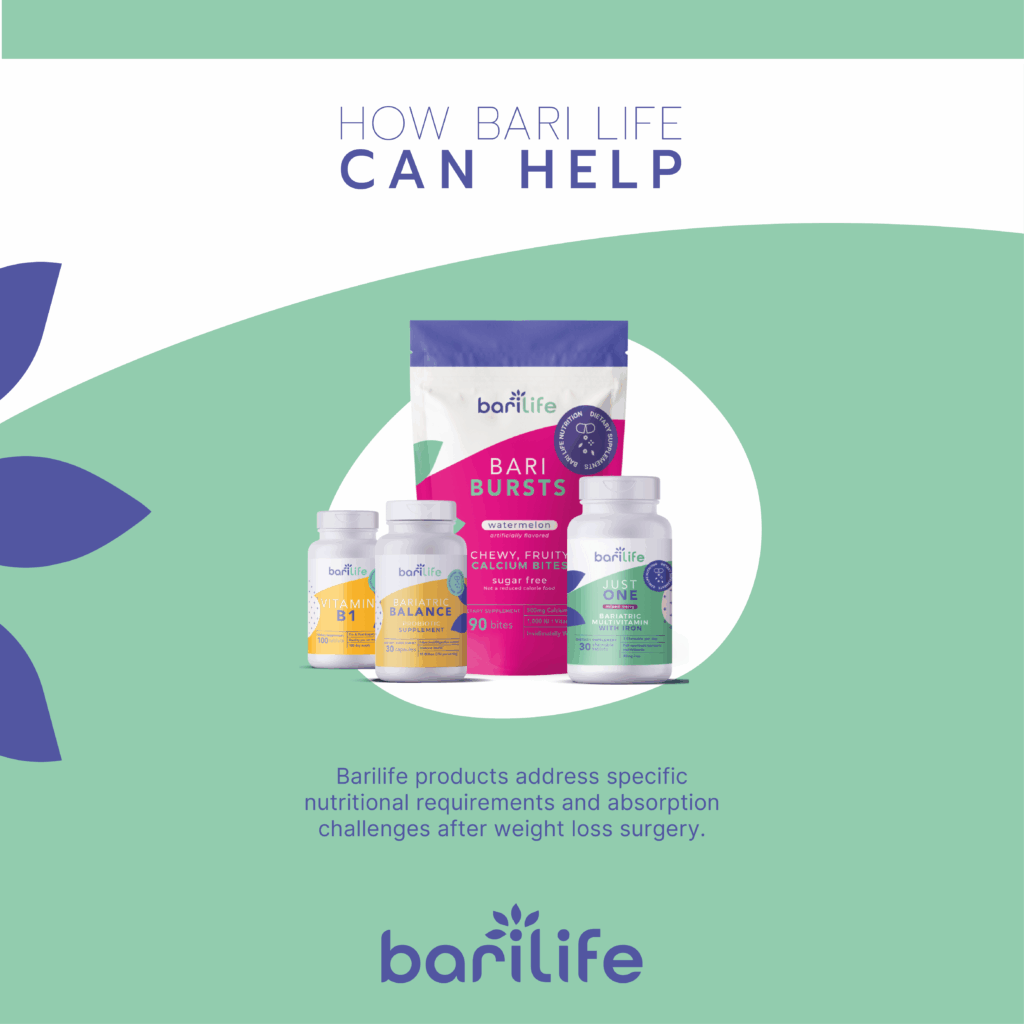
If you want to learn more, why not check out these articles below:
Resources
Life After Bariatric Surgery. (N.D.) ASMBS.
Transfer Addiction Following Bariatric Surgery. (2016). OAC.



What are your tips and tricks to post-bariatric success?